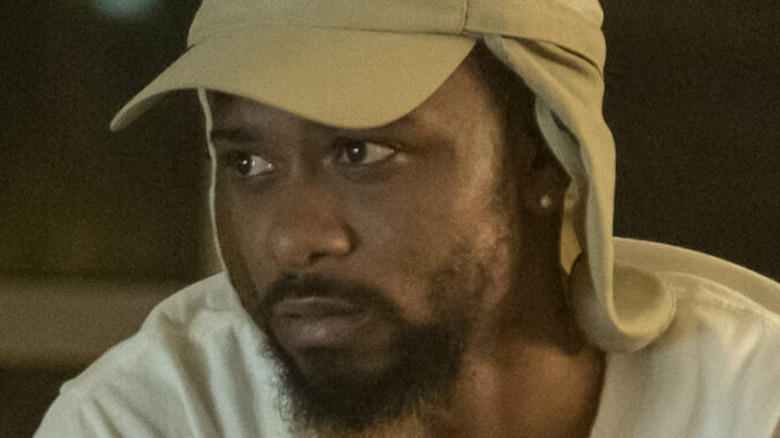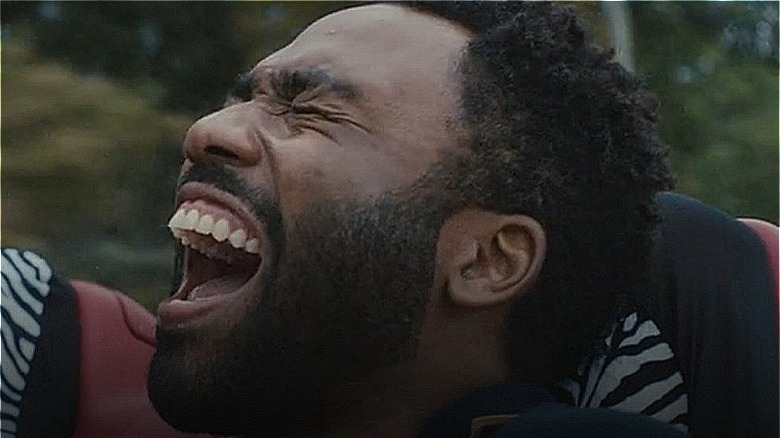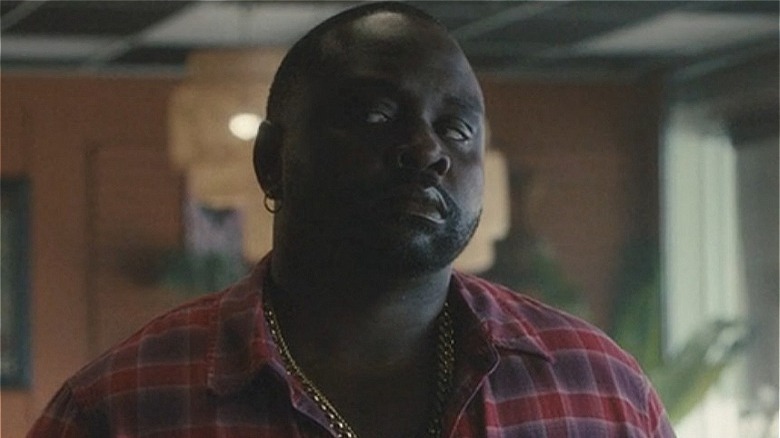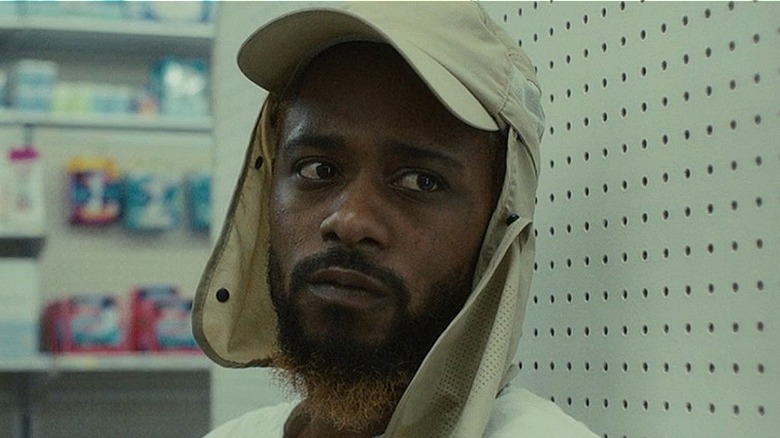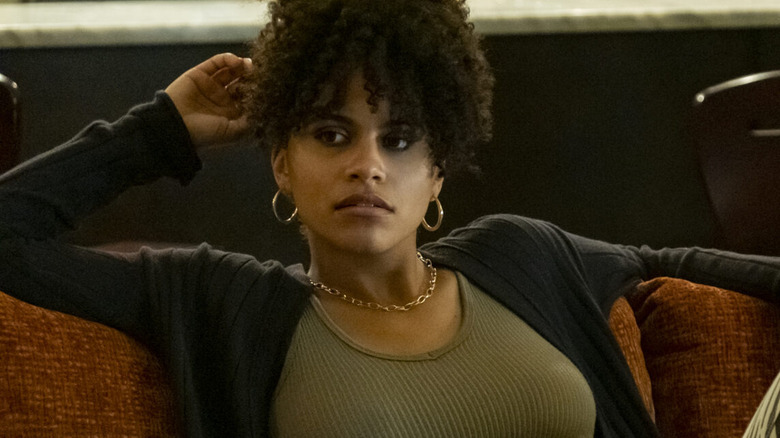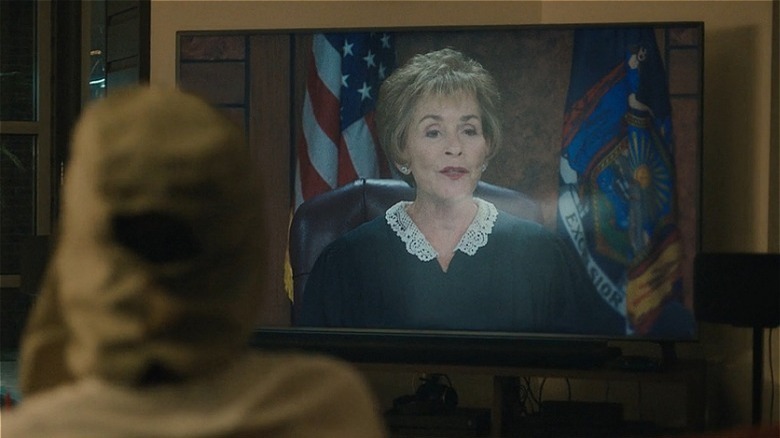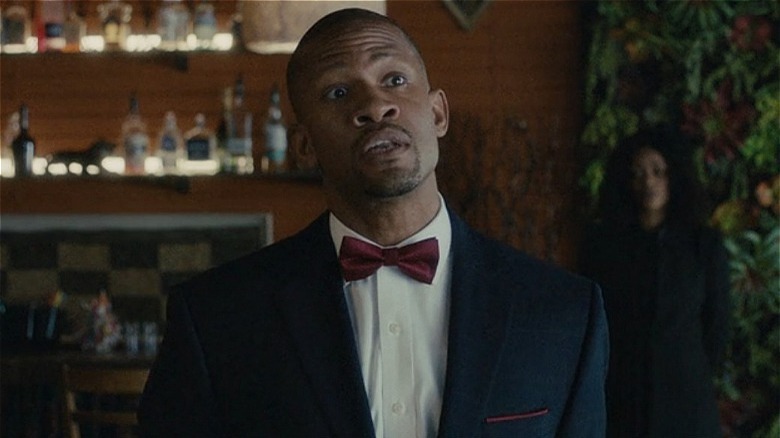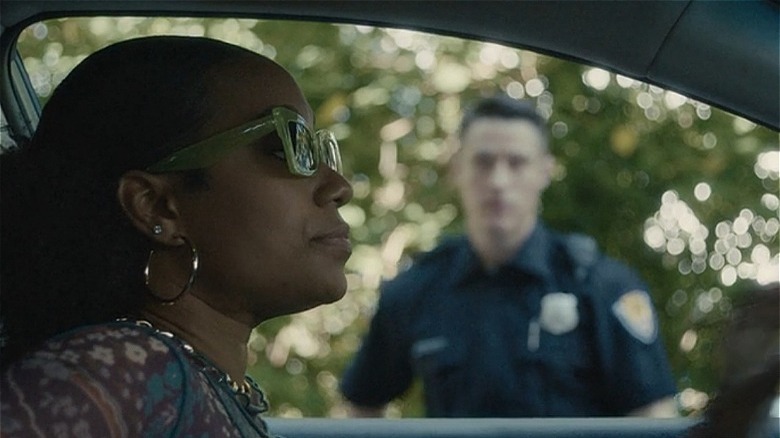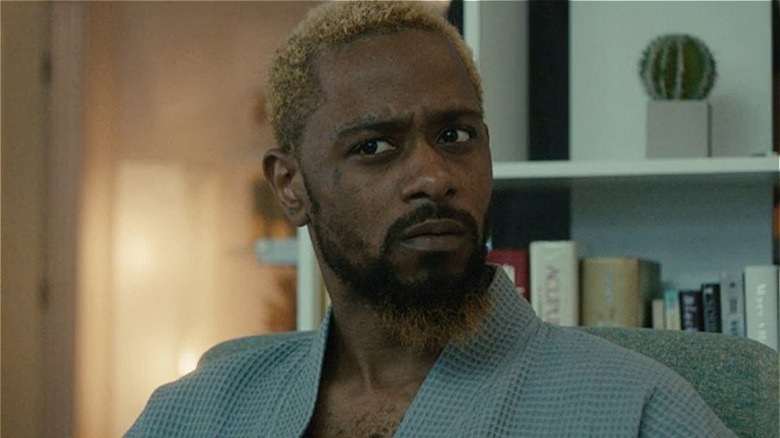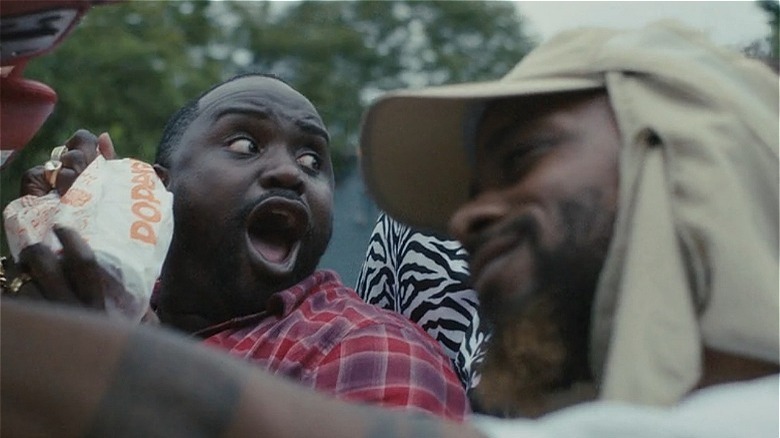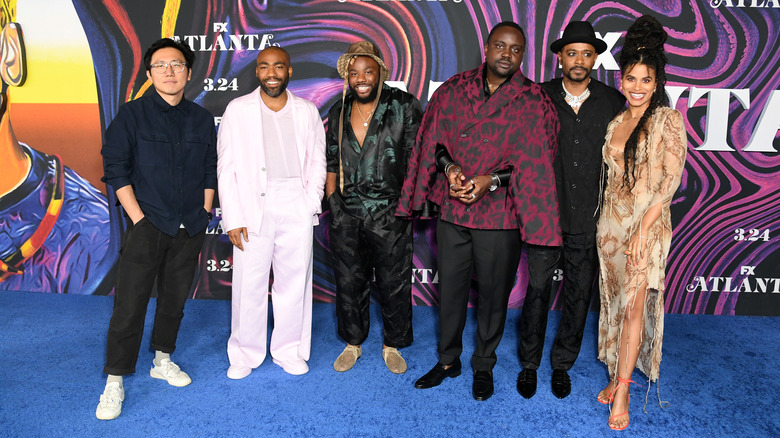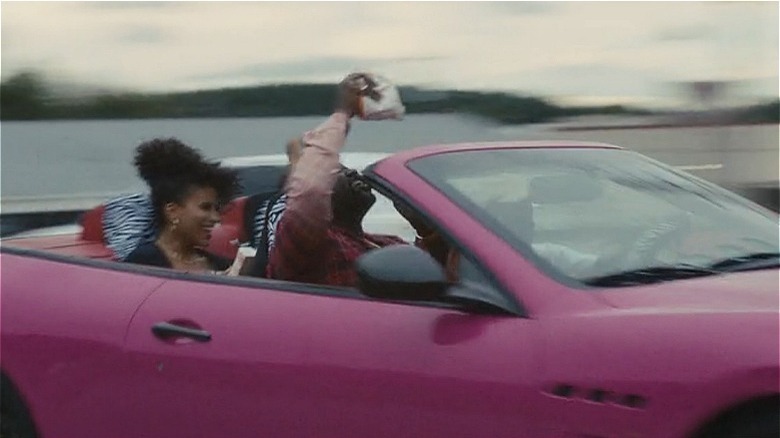The Ending Of Atlanta Season 4 Explained
The series finale of "Atlanta" ends with a mix of closure and mystery. Fans expect the unexpected from creator-showrunner Donald Glover and his rule-breaking production team, but the ending of Season 4 still surprised audiences with a big left turn.
In Season 4, the show's characters feel painfully real as their surroundings grow more and more surreal by contrast. By the end of the show, each character's ending is implied but not quite confirmed, leaving viewers feeling a sense of wary calm. In "Atlanta," anything can happen next.
"You don't know if a joke is coming or if someone's gonna get shot," executive producer and director Hiro Murai told in GQ. "It could go either way. I think to achieve that, we're doing this thing where it feels grounded, or like it lives in a very particular world, but it also has one foot off the ground a little bit, to the point that it feels a little wobbly."
Season 4 is marked by magical realism, telling cautionary tales that feel like throwbacks to gothic horror mixed with the sensibility of a Black "Black Mirror." "Atlanta" has an excellent track record of using magical realism to explore emotional experiences outside the bounds of reality and the viewer's lived experiences.
The end of Season 4 takes the show's hallmark moldable sense of reality to the max. Could "Atlanta" all be a dream?
Earn's happily ever after
Earn's journey is his name. He wants to earn money, stability, and success. He copes with conflicting needs for outward success and interpersonal happiness in Season 4. In the end, Earn finally has to decide what's most important to him. The catalyst? Possibly poison fish.
Earn (Donald Glover) prepares to move to LA with his on-again, off-again girlfriend Van and their daughter Lottie. Despite getting his happily ever after, Earn fixates on the metrics of success and stability defined by mainstream culture. He starts the series unemployed and broke and ends the series with plenty of money and a fancy job in the entertainment industry. So while he has obtained the mainstream establishment's version of success and stability, his inclination towards seeking respectability takes him to a dangerous place in the "Atlanta" finale.
Earn wants to support the first Black-owned sushi restaurant in the city, but Al and Van aren't into it. Earn struggles to keep them at the table, ignoring red flags. His priorities are tested when the sushi chef sends them blowfish — a delicacy that can be toxic if cut incorrectly. Earn is playing a dangerous game of Good Intentions Chicken — will he risk poison to prove his support to the Black community?
Earn has to let go of his preoccupation with his community's place in culture to focus on the wellbeing of his close circle. In the end of Season 4, he gladly chooses to give up his metaphorical and literal seat at the table for a convertible backseat filled with his loved ones (also, Popeyes).
Al finds his place
Alfred, aka Paper Boi (Brian Tyree Henry), made it as a rapper, but he's still finding his place in the world. His character arc brings him from broke to successfully touring Europe, then back to Atlanta to grapple with success. He's torn between wanting to be a stoic recluse and wanting to be known.
"Fame is a monster," Hiro Murai told GQ during his October 2022 interview. "It sort of eats you alive and your relationship to the world changes. You can't go anywhere. Everybody has a one-sided relationship with you because they know who you are."
Al buys a farm outside the city where he lives alone. It's an introvert's dream, until he breaks his foot and nearly dies alone. Humbled by the experience, Al finally opens up. He plans to keep the farm, although since he no longer believes he can only rely on himself, he stops blowing off Earn's phone calls.
Al enjoys the benefits of success, but he's not going to pretend to be someone he's not. His gut instinct says not to eat the blowfish, and it's 100% correct.
When push comes to shove, Al's bluntness is an asset. He speaks up, upsets the sushi chef, and possibly saves his, Van, and Earn's lives. He's not going to ignore red flags for the sake of manners or reputation. Although Al's "I'm-too-old-for-this-sh**" attitude is consistent throughout the series, in the end Al chooses his reality over a performative act of "sophistication" regardless of how it might look or the message it might send to others.
Is it all Darius' dream?
The ending of "Atlanta" focuses on Darius, Al's right-hand man. Whimsical, magical, and mysterious, Darius (LaKeith Stanfield) exudes a calm demeanor while he's constantly challenged by a cruel and bizarre world. His ending is the most mysterious in the series. In one episode, "Atlanta" pulls a metaphysical rug out from under viewers, leaving us to wonder whether or not it was all a dream.
Darius struggles to accept the blurry lines between reality and fantasy. In the series finale, Darius finds relief for his anxiety and an outlet for his mental wanderlust by visiting a sensory deprivation tank each week. His journey throughout the episode is surreal — a series of interactions that end with him waking up alone in the tank.
Darius' future is unclear at the end of the series. His arc is entangled in Al and Earn's trajectories throughout the show, and now he faces a solo future in the city. His tank dreams are intensely real, leaving characters and viewers alike confused. Darius has one way to tell if he's dreaming — Judge Judy. She's always on TV, and if her figure is extra thick when she rises from the bench, that how Darius knows he's dreaming.
Darius' surreal day ends with a beautiful moment with his close friends, and the series ends with Darius, alone on the couch. In the last shot of the series, Darius watches Judge Judy. Her backside isn't shown, but whatever Darius sees, he smiles with relief. As the screen cuts to black, the conclusion is left for interpretation. Whether or not it was all a dream, the connections between these people are very real.
Van finds herself
Van (Zazie Beetz) is a wildcard — a woman who learns about herself by taking risks (in her own carefully considered way) as she demonstrates with her emotionally restorative rampage through Europe in Season 3. By the end of Season 4, she's agreed to move LA with Earn and Lottie as a family. Van's character arc is filled with surprises throughout "Atlanta" as she explores her identity and finds belonging. Van wants to figure out what she wants, and she does, as far as we can tell.
By the end of Season 4, Van is assertive and decisive. Despite her stake in Black-owned fine dining, she's upfront about her true desire — Popeyes. Her quickness to identify what she wants and communicate it directly shows a ton of growth as an independent woman in an interdependent community. Her decision to join Earn in LA comes from the same self-assured place — she wants to be loved and seen for who she is, not just as a mother or partner.
While doing press for "Atlanta," Beetz seemed to echo Van's contentment.
"We're ending on what feels like a peak and not letting it peter out," the "Deadpool 2" star shared with Newsweek. "I think the best thing is knowing when to end it and knowing when to move on with things."
Why Judge Judy?
"It was all a dream" can be a cop-out ending. However, "Atlanta" pulls it off in a series finale without jumping the (very last) shark. How? Judge Judy's booty.
Executive producer Stephen Glover told Deadline how the writers decided to hinge reality as we and Darius know it on a silly detail.
"I think we had just seen a meme of thick Judge Judy," said Glover. "We were like, 'This would be funny if this was your tell in a dream world.' We just crafted it to be kind of this funny meme. I think it's hilarious."
Yes, the surreal ending of "Atlanta" is meme-inspired. Throughout the show, "Atlanta" writers prioritized having fun with the show's subject matter, no matter how dark (think "Teddy Perkins") and struck a delicate balance of silly and real absurdity.
"There's this idea that everything has felt so dream-like in 'Atlanta' anyway. [Whether it's] real or fake, it all feels real to you anyway," Glover said later in his Deadline interview. "I think that's just the idea that we walked away with — this idea of having your friends together and having a good time and eating Popeyes and laughing. It's kind of like, is that a dream or are you manifesting these things that you wanted anyway? It can feel like a dream."
One last iconic villain
"Atlanta" captures day-to-day life and the sunnier side of surreality, but it's known for its stylized darkness and procession of unforgettable villains. The show's finale ends with a final villain — a sushi chef with a bruised ego.
Much like Jordan Peele's films, "Atlanta" succeeds in conveying the emotional experiences of marginalized groups by bending reality. Some episodes feel downright dystopian, and many are based on true stories. Unlike many shows, there's no main antagonist, just very creepy folks who show up to make life a living hell for one episode only.
The series ends with a last hurrah for its villain tradition in the form of Atlanta's first Black-owned sushi restaurant, complete with a long classic villain-style soliloquy. The chef's perspective seems solid as he paints a complex picture of the cultural dismissal of his sushi restaurant and larger forces of racial inequity. Still, no one wants to risk eating poison fish in the end; words aren't stronger than poison. The chef proves himself a true villain when he tries to keep his customers in the restaurant by force.
The sushi restaurant communicates an emotional conclusion that each character is learning on their own. Trusting the people close in life is more important than blindly supporting larger group identities, which can be commercialized and corrupt. It can be hard to tell what's real besides one's own gut (and if that gut says no to fish, trust it).
Fast food, fine dining, and systemic racism
"Atlanta" explores Black folks' specific experiences and difficulties in modern America. When Earn, Val, and Al decide to trust their rumbling guts and leave the sushi restaurant, the chef weaves a logic web of guilt and obligation. When they still want to leave, the sushi chef is prepared to lock them inside. While the chef claims to be motivated by a desire to lift the entire Black community, his actions tell us that he might be more interested in advancing his own status at the expense of the Black community — or, at least at the expense of three specific Black people we know about.
The juxtaposition of the sushi restaurant and Popeyes could be an exploration of how society interacts with organically grown cultures once they've been converted into products. Who's really feeding culture, and who's poisoning it? The sushi chef points out that Popeyes is racist, its recipes are from an Italian family, and the chain steals Black traditions and sells them back to communities of color. The sushi chef is working to enter a culinary world that traditionally excluded Black culture, but he's ready to poison and kidnap three Black people if they don't support his efforts.
Nothing as it seems
In "Atlanta," reality is malleable. The old becomes the new, and vice versa. For example, an old Blockbuster morphs into a new sushi restaurant. The show's final season explores the emotional experiences of its main characters as they move through surreal surroundings, learning to adapt.
The fascinating thing about the ending of Season 4 is that each character's arc parallels the theme: the old becomes the new. Earn's desperation to prove himself in Season 1 is replaced by his need to forge strong family ties in Season 4. Al goes from a rapper-dealer barely surviving in Atlanta to an internationally known artist. Darius' carefree attitude from Season 1 grows into a cautious, gracious approach.
If nothing is as it seems, "Atlanta" leaves much of its ending open to interpretation. Did Darius see a flat or a round behind on Judge Judy?
The emotional experience of adapting to increasingly bizarre and threatening surroundings is well-communicated by the ending of Season 4. The characters each learn to stop fighting their own nature and go with the flow, whether dream or reality.
The joy of "Atlanta" is its ability to live in the silly and serious at the same time. It's silly enough that the entire show could be a dream based on Judge Judy's butt. However, the writers deftly handled concluding each character's story just enough to feel some resolution, but they left a good bit of their stories open for interpretation as well.
Magical realism
The ending of Season 4 of "Atlanta" would be impossible to follow without understanding magical realism, a storytelling strategy using matter-of-fact inclusion of fantastic or mythical elements into seemingly realistic fiction (according to Brittanica.com). Some say magical realism is a natural outcome of postcolonial writing, which must make sense of at least two separate realities — the reality of the conquerors as well as that of the conquered.
"Atlanta" is spot-on with Brittanica.com's definition. "Atlanta" blends reality and fantasy throughout the series (remember the invisible car from Season 1?) but does into full-on magical realism in Season 4. Plot takes a backseat to emotional experience, allowing audiences to suspend disbelief and reality and roll with the deeper context. Throughout the season, each character has to find their own way through a passageway from somewhere they were stuck to a new, unknown location. The magical elements in Season 4's ending represent the parts of each character's reality that eludes them.
The ending is open to interpretation, leaving viewers to digest and think long after credits roll. As a work of art, it shows consideration to viewers by giving them something new to see every rewatch as audiences grow and change themselves.
The end of Atlanta
"Atlanta" is a beautifully written, shot, and acted series all the way through. Its unique tone comes from a strong production team and writing staff as well as long-time collaborative relationships, particularly between creator Donald Glover and director-executive producer Hiro Murai.
Glover and Murai began working together in 2013 on the short film "Clapping for the Wrong Reasons." The collaborators found they enjoyed breaking rules and veering into surreality and absurdity in the midst of seriousness, and the seeds for "Atlanta" were planted. They hit gold with their music video for "This is America" (featuring Donald Glover's musical alter ego Childish Gambino) and sharpened their cinematic skills before creating "Atlanta."
The ending of Season 4 of "Atlanta" wasn't originally meant to the be finale, but Glover and Murai knew to go with the flow when inspiration strikes. In fact, "Atlanta" never expected to make more than two seasons, so the show's team got to experiment and explore for another two seasons before ending with the cliffhanger of the decade.
What's after Atlanta?
"Atlanta" had a solid run. Creator Donald Glover spoke on his reasons for ending "Atlanta" at the Television Critics Association Winter Press Tour in 2022 (via Newsweek).
"Death is natural," Glover said. "I feel like when the conditions are right for something, they happen, and when the conditions aren't right, they don't happen. I don't feel any longevity. Because then things start to get weird. The story was always supposed to be what it was. And the story, it really was us. Everybody in that writers' room, everybody on set. It really was what we were going through and what we talked about. I think it ends perfectly."
Glover's sentiments are reflected in the ending of "Atlanta" — these characters and anthologies are timeless and could easily come back anytime. However, much like zombies and vampires, just because something can come back from the dead doesn't mean it should.
Glover said he's open to continuing the series, "If there's a reason to do it, of course. Like a Christmas special. It always depends. I like keeping my options open." The ending of "Atlanta" Season 4 means the beginning of many more projects for its cast and production team. Look no further than Amazon Prime in 2023 — Hiro Murai is working with Donald Glover on his "Mr. And Mrs. Smith" reboot.
